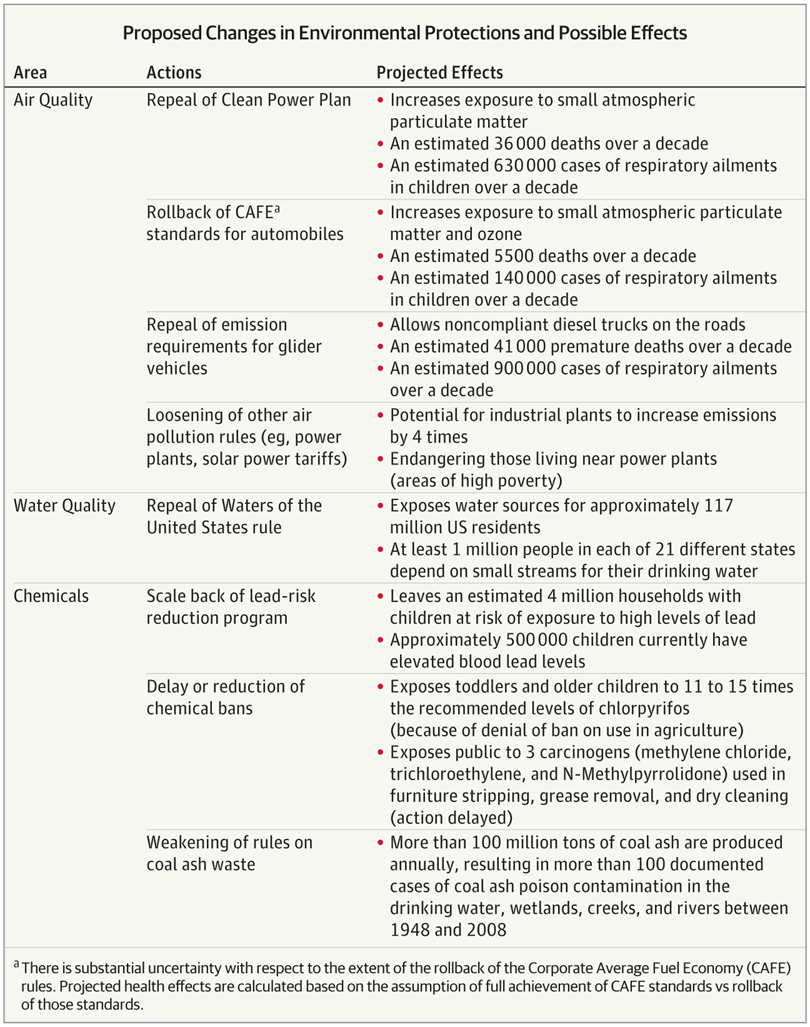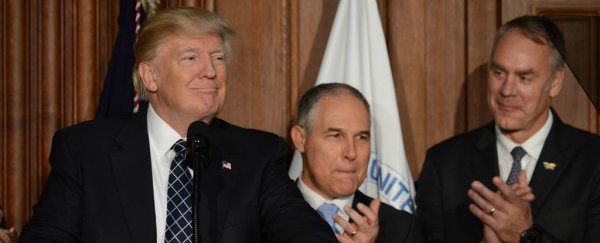President Trump may have promised to "get rid of the regulations that are just destroying us," but it seems as though his administration's policies will only make matters worse.
A new opinion piece, written by two Harvard researchers in a leading medical journal, has calculated that the Trump administration's environmental agenda could result in 80,000 more deaths and lead to respiratory problems for more than 1 million people every decade.
The column was written by a Harvard biostatistician and a Harvard public health economist, and while the article is not peer-reviewed, most of the calculations are based on data from the US Environmental Protection Agency (EPA) itself.
In less than a year and a half, President Trump and the EPA have successfully reversed or proposed to reverse no less than 60 environmental rules. Nevertheless, these regulatory roll backs were made without considering the impact that such measures could have on public health.
As a result, Harvard researchers have put forward "an extremely conservative estimate" of what these public health consequences could look like.
Their essay predicts, for instance, that the Trump administration's repeal of the Clean Power Plan will result in an estimated 36,000 deaths and a whopping 630,000 extra cases of childhood respiratory problems – all in the next decade.
These numbers are based on the EPA's own science – specifically, a regulatory impact analysis on air quality and health impacts.
Under the Obama administration, such information was available for public consumption in the form of a Clean Power Plan fact sheet.
The fact sheet informed Americans that the Clean Power Plan was predicted to avoid 3,600 premature deaths, 1,700 heart attacks, 90,000 asthma attacks and 300,000 missed work and school days. The rule was also expected to bring in $14 to $34 billion in health benefits.
Shortly after the Trump administration took over, however, that fact sheet was quietly deleted from the EPA website.
Now, this important data has now been brought to the forefront once again.
Drawing upon the same regulatory impact analysis, the Harvard researchers determined that if the Trump administration successfully rolls back auto emission targets, as they have promised to do, the move will result in 5,500 more deaths and 140,000 more cases of childhood respiratory ailments over the next decade.
Just this week, Scott Pruitt, the administrator of the EPA, decided on a huge environmental roll back – one that severely limits Obama-era regulations on water pollution. The consequences of this decision could be dramatic.
The Harvard researchers argue that a repeal of the Waters of the United States Rule, which extends the Clean Water Rule to more streams and wetlands, could jeopardize clean water sources for around 117 million Americans.
 (JAMA)
(JAMA)
Even though the Harvard researchers' findings are largely based on EPA data, the agency has dismissed their conclusions entirely.
"This is not a scientific article, it's a political article," the EPA said in a statement to Bloomberg.
"The science is clear, under President Trump greenhouse gas emissions are down, Superfund sites are being cleaned up at a higher rate than under President Obama, and the federal government is investing more money to improve water infrastructure than ever before."
The agency did not elaborate or provide additional context to support these remarks, but it appears that the Harvard researchers were prepared for the agency's retaliation.
A subsection of their essay specifically deals with the EPA's repeated attacks on science.
"One might imagine that the science that supported enactment of these rules would make repealing them difficult. But that is not the case," the researchers argue.
"Even as it is targeting environmental rules, the Trump administration is taking aim at the use of science that supports public policy."
The essay cites Scott Pruitt's controversial new rule that would stop policy from being based on research that is not accessible to the public. The policy would severely restrict the science that the EPA can use, and scientists have spoken out against the measure, calling it "weaponized transparency."
"EPA can only adequately protect our air and water and keep us safe from harmful chemicals if it takes full advantage of the wealth of scientific research that is available to the agency," scientists argued in a letter to the agency.
With Scott Pruitt at the EPA's helm and President Trump more determined than ever to revive the fossil fuel industry, it seems unlikely that the EPA will be taking advantage of the best available science anytime soon - even if it's their own.
The opinion column has been published in the Journal of the American Medical Association.
